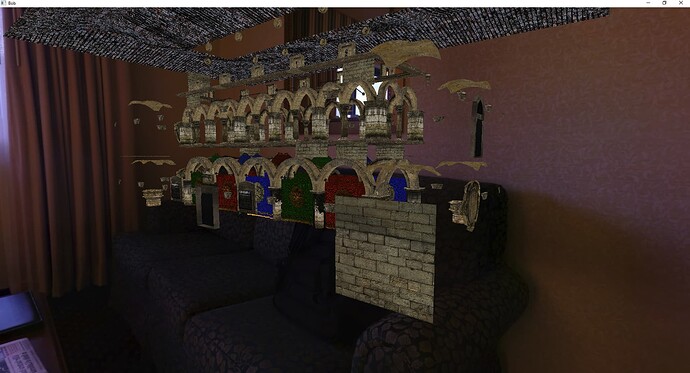Hi, I am currently trying to load the Sponza model from the glTF-Sample-Models repository for my PBR Renderer (its a gltf model). I have been able to load smaller models quite successfully (like the boombox from the gltf-sample-models), but when I try to load the Sponza scene, some meshes aren’t properly scaled.
demonstrates my issue (For debug purposes I am not actually doing the PBR calculations here, that’s just the albedo of the model). The wall is there, but it’s only a 1x1 quad with the wall texture, even though it’s supposed to be a lot bigger ans stretch across the entire model. Same goes for every wall and every floor in the model. The model is not broken as Blender and that default windows model viewer can load it correctly. I am even applying the mNode->mTransformation, but it still doesn’t work. My model loading code looks kind of like this:void Model::LoadModel(const fs::path& filePath)
{
Assimp::Importer importer;
std::string pathString = filePath.string();
m_Scene = importer.ReadFile(pathString, aiProcess_Triangulate | aiProcess_GenNormals | aiProcess_CalcTangentSpace);
if (!m_Scene || m_Scene->mFlags & AI_SCENE_FLAGS_INCOMPLETE || !m_Scene->mRootNode)
{
// Error handling
}
ProcessNode(m_Scene->mRootNode, m_Scene, glm::mat4(1.0f));
}
void Model::ProcessNode(aiNode* node, const aiScene* m_Scene, glm::mat4 parentTransformation)
{
glm::mat4 transformation = AiMatrix4x4ToGlm(&node->mTransformation);
glm::mat4 globalTransformation = transformation * parentTransformation;
for (int i = 0; i < node->mNumMeshes; i++)
{
aiMesh* assimpMesh = m_Scene->mMeshes[node->mMeshes[i]];
// This will just get the vertex data, indices, tex coords, etc.
Mesh neroMesh = ProcessMesh(assimpMesh, m_Scene);
neroMesh.SetTransformationMatrix(globalTransformation);
m_Meshes.push_back(neroMesh);
}
for (int i = 0; i < node->mNumChildren; i++)
{
ProcessNode(node->mChildren[i], m_Scene, globalTransformation);
}
}
glm::mat4 Model::AiMatrix4x4ToGlm(const aiMatrix4x4* from)
{
glm::mat4 to;
to[0][0] = (GLfloat)from->a1; to[0][1] = (GLfloat)from->b1; to[0][2] = (GLfloat)from->c1; to[0][3] = (GLfloat)from->d1;
to[1][0] = (GLfloat)from->a2; to[1][1] = (GLfloat)from->b2; to[1][2] = (GLfloat)from->c2; to[1][3] = (GLfloat)from->d2;
to[2][0] = (GLfloat)from->a3; to[2][1] = (GLfloat)from->b3; to[2][2] = (GLfloat)from->c3; to[2][3] = (GLfloat)from->d3;
to[3][0] = (GLfloat)from->a4; to[3][1] = (GLfloat)from->b4; to[3][2] = (GLfloat)from->c4; to[3][3] = (GLfloat)from->d4;
return to;
}
I don’t think the ProcessMesh function is necessary for this, but if it is I can post it as well.
Does anyone see any issues? I am really getting desperate over this…
